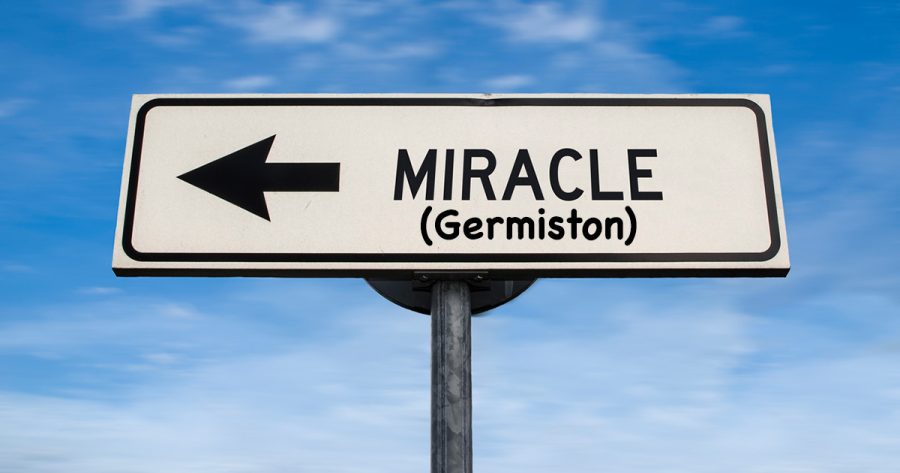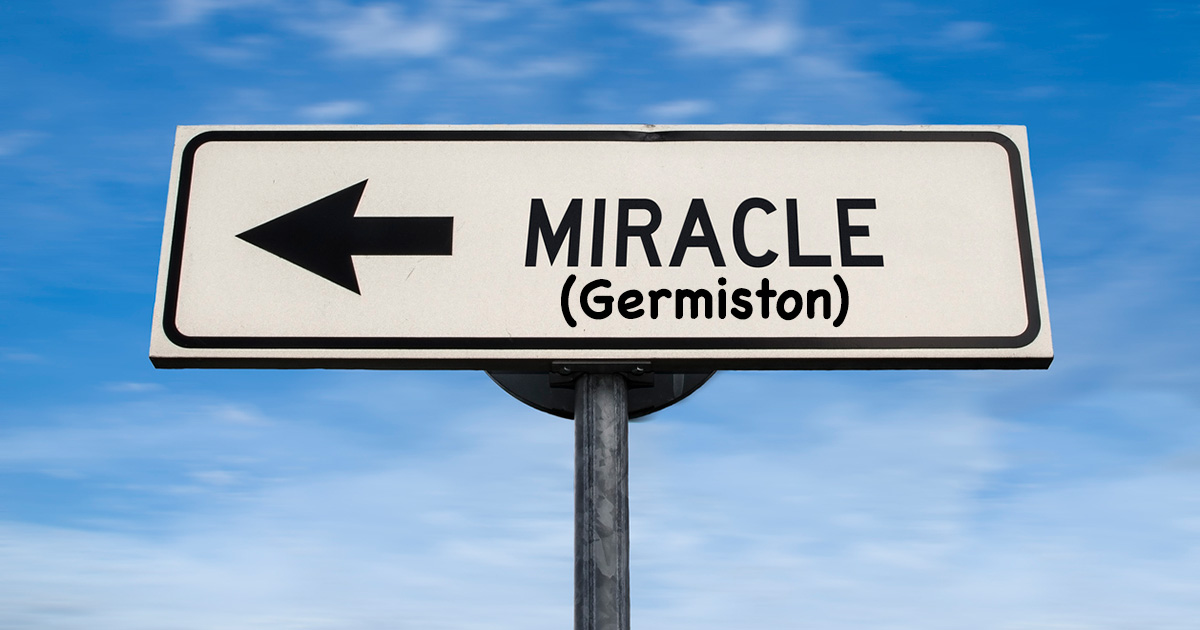
Miracle on Mons Road in Germiston – by Viv Vermaak
I have lived in Germiston for a long time. This is the first year I have thought of moving out… writes Viv Vermaak. I have never felt so disturbed by the way our country is headed. Nor so afraid or alone. It is not because Ekurhuleni’s municipal infrastructure is falling apart, so much so that […]

I have lived in Germiston for a long time. This is the first year I have thought of moving out… writes Viv Vermaak.
I have never felt so disturbed by the way our country is headed. Nor so afraid or alone. It is not because Ekurhuleni’s municipal infrastructure is falling apart, so much so that we made the front page of the Citizen: ‘A town collapses,’ cried the headline.
To us, load-shedding is a blessing – it is a few predictable hours a day, compared to the sporadic three or four-day outages we have become used to. Neither is it because of poverty, which has gone from its creeping form in our informal settlements to a confident leopard crawl through the suburbs, camouflaged as crime.
Nor is it corruption or service delivery that is alarming me. It is that we were told we were not allowed to talk about it, in a decision that appeared to have been taken in lockstep by ANC and DA councillors, along with local CPF and community leaders. WhatsApp groups were closed. No discussion about service delivery was allowed – at all. People were banned or blocked if they dared mention outrage over the electricity crisis. Only administrators were allowed to post. Entire communities were instantly isolated from each other on chat groups. The terror and alienation I felt almost overnight startled me.
Total chat group communication blackout?
It is the most foolish, panicky or totalitarian behaviour one can inflict on a group of people. I believe it was the former, but the line becomes very thin when the nice guy you used to greet at the Pick n Pay transforms, and now wields the power of the blue tick like Excalibur when he is the gatekeeper of a chat group.
Dark mutterings about the censorship fermented into heated words of outrage in local shopping aisles, after which administrators would open a group and send a message of peace: ‘It is only by standing together that we can solve our problems’, they placated.
‘How do we solve our problems if we are not allowed to mention what they are?’ I asked the moment we were allowed to speak again. ‘What about freedom of speech?’
It was followed by: ‘It is because of you blooming liberals with your ‘freedom of speech’ that this country got into the state it is in!!!! We should be taking up arms!’ (Messages composited and redacted for polite reading.)
Mud-slinging
The obligatory political and racially charged mud-slinging ensued, with the predictable results – groups closed again for a week. We were not allowed to talk, in times of our most significant need for each other as a community. And when we did talk, we spoke kakly. The anxiety and fear created when you know there is a lot of tension, no electricity and zero community cohesion skills is overwhelming.
I am a classic blooming liberal with a keen sense of self-determination, so this was a proper existential crisis. To find freedom in an unfree WhatsApp group, I contacted councillors and community leaders privately, pointing out the folly of silencing entire communities, even ones as diverse as ours. I pointed out the danger, not only psychologically but physically. As it stood, I argued, the zombie apocalypse could break out at the squatter camp opposite Primrose Cemetery Rand and engulf us in the suburbs in our sleep because no one could warn anyone else.
There was some ‘um’ing and ‘aah’ing, but eventually, the law and order in WhatsApp groups appeared to be a stronger motivation to keep groups closed than Armageddon. I needed a different angle.
It came to me as I drank my morning coffee from my beach chair in the backyard, watching and listening to the hadedas flying over the mine dumps.
I approached key players individually again, but this time with a David Attenborough or lower Germiston tone:
‘Guys, every morning when we go out into the large gardens we still have in Delville, we hear the birds tweet. They do it every day; who is still there? Was there an eagle in the area disturbing the peace? Did Frikkie Finch tear up his house again? It is a sense of community that repeats itself every day. Humans are like that. These WhatsApp groups are the same. It is just twitter. Allow it. It is the quickest way for all of us to know where we stand. Isolating us from each other is your most risky and counter-productive move.
‘Similarly, when hunting in the forest, wolves call out to each other, even when far apart, to hear how many of the pack survived and where they are. We have to hunt like wolves together to survive. So let us hear each other’s calls.’
Somebody opened up the groups. That is not the miracle, although I was amazed.
Something had turned
Suddenly, many different groups for service delivery sprang up, with some people complaining that there were now too many groups and too much chatting. The councillors must have shaken their heads in disbelief. But something had turned.
A kind of self-censorship was evident in the groups, with fewer aggressive and racial attacks. People complained less. Maybe when you take something away from people, they appreciate it more. The marvellous thing was that more and more people started realising that the government could not be relied on as a solution, regardless of how much one shouts and protests.
Thus a new, positively slanted WhatsApp group was formed. I was one of the founder members. We shared ideas about simple things one could do to improve our immediate circumstances: refuse-removal stokvels, solar sharing or joining existing CPF structures.
Eventually, you get tired of being ashamed and afraid all the time.
Our first project will be to clear some of the large traffic circles.
Two guys with bakkies volunteered to help, and I pledged my petrol mower with an operator. That is the miracle. That people are starting to do things for themselves without expecting anything from the government. It’s not spectacular, as miracles go. My community is too heterogenous to create that sense of samewerking en ontwikkeling one wishes for in more sentimental moments.
Instead of hearing Khumbaya playing in the background, you’ll listen to an ‘eish’ from my gardener as we tackle the corner thicket. Small steps. But we can start somewhere. Learning how to have that excruciatingly difficult talk with an erring new neighbour about how we all contribute to safety and clean up after ourselves might seem small. Still, the ripple effect could be more meaningful than a nationwide strike or political protest.
These are the baby steps to freedom. I wish we had started taking them 29 years ago…
This article was first published on the Daily Friend and is republished on SAPeople with Viv Vermaak’s kind permission.